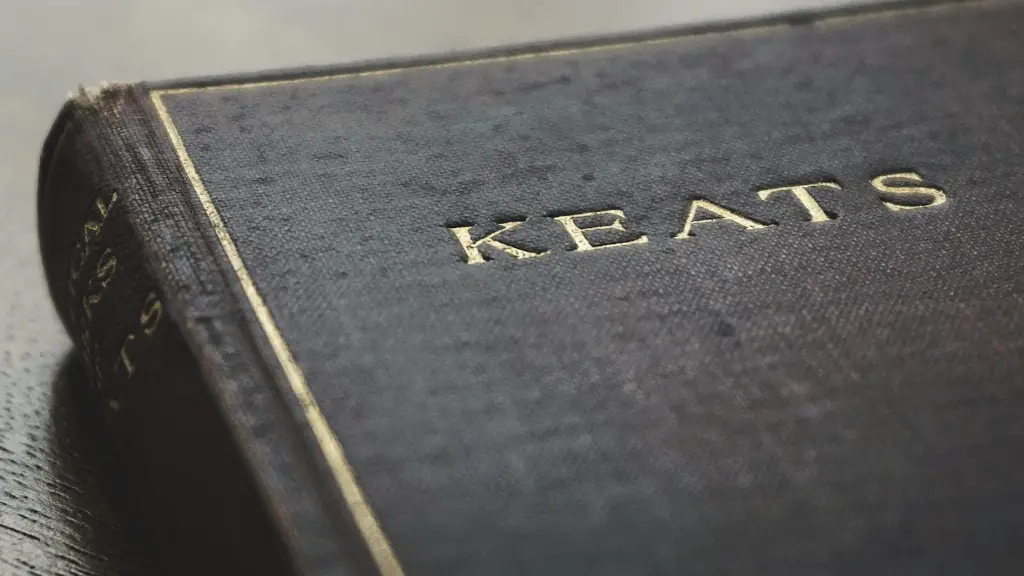Coleridge was an English poet, literary critic, and philosopher who, along with his friend William Wordsworth, was a founder of the Romantic Movement in England. He is best known for his long narrative poem, The Rime of the Ancient Mariner, and his influential work, Biographia Literaria, which is considered one of the most important and influential works of criticism in the English language. Coleridge believed that a poem should be built upon and driven by a “living Power”, which he referred to as the “esemplastic power of the imagination”. He argued that this power allowed an individual to analyze and interpret their experiences in a creative way and then express them through words.
As Wordsworth argued, poetry is the spontaneous overflow of powerful emotions. Coleridge further argued that these powerful emotions can be transformed into clear and meaningful language through the use of the imagination. He believed that the poet should strive to create images that capture the essence of the emotion they are trying to convey. Coleridge also believed that a poet should be able to control their words and phrases in order to create a poem that is filled with beautiful and profound language. In his famous poem, The Rime of the Ancient Mariner, Coleridge was able to do this perfectly.
In addition to his concept of the esemplastic power of the imagination, Coleridge defined poetry as the “best words in the best order”. He argued that poetry should always aim for the highest possible level of clarity and precision. He believed that the poet should strive to use the most vibrant words and phrases that accurately represent the emotion they are attempting to express. The poet should also use syntax, meter, and sound to create an atmosphere of beauty and meaning.
Coleridge also believed that poetry should be rooted in truth and have relevance to the human condition. He argued that the poet should use their imagination to create a poem with a purpose, one that communicates something valuable and meaningful to the reader. ForColeridge, poetry was not simply about beauty and emotion- it was about communicating truths about the human experience.
Coleridge is widely regarded as one of the most influential poets of the Romantic Movement in England. His works are still studied and appreciated today, and his ideas about poetry continue to serve as an inspiration for today’s poets.
The Influence of Coleridge on Later Poets
Coleridge’s influence on later poets has been immense. His ideas about the power of the imagination are still echoed in the works of modern poets. Coleridge’s ideas about the purpose of poetry and his belief in the importance of connecting with the reader have also been major influences on later poets.
The work of Walt Whitman is greatly indebted to Coleridge’s ideas. His use of innovative and vivid language to explore the human condition is clearly informed by Coleridge’s concept of the esemplastic power of the imagination. His works often reach out to the reader in an emotionally powerful way, and this is something that Coleridge would have certainly appreciated.
The work of T.S. Eliot is also greatly indebted to Coleridge. Eliot makes extensive use of sound and rhythm in his work, reminiscent of the poetic devices employed by Coleridge in The Rime of the Ancient Mariner. Eliot also uses words to articulate ideas about the human experience, something which Coleridge argued was the primary purpose of poetry.
Coleridge’s ideas about poetry still linger in the works of modern poets. His concept of the esemplastic power of the imagination and his belief that poems should communicate something meaningful to the reader still hold true today. His work and ideas continue to serve as an inspiration to poets all over the world.
The Importance of Imagination in Poetry
For Coleridge, the imagination was the engine that drove a poem. He argued that without this living power, without an intense engagement with the imagination, a poem could not reach its highest level of clarity and meaning. The poet had to use their imagination to take their powerful emotions and transform them into vivid and meaningful images. He argued that it was only through the use of the imagination that the true beauty and power of a poem could be unlocked.
Many poets have continued to embrace Coleridge’s idea of using the imagination in creating their works. The works of poets such as Walt Whitman and T.S Eliot are filled with vivid imagery and powerful emotions. These poets use their imaginations to transform the everyday objects and scenes of their lives into beautiful and meaningful works of art.
This use of imagination has been an important part of poetry ever since Coleridge first argued that it was an essential element of the poetic process. His belief in the power of the imagination continues to be an inspiration to modern poets and an important part of the poetic tradition.
The Themes of Poetry According to Coleridge
Coleridge believed that poetry should aim to be more than just beautiful and emotive language. He argued that it should always be connected to the human experience and should aim to communicate something profound to the reader. He believed that the themes of poetry should be rooted in truth and should reflect the realities of our lives.
Coleridge was an avid reader, and this had a great influence on the themes of his poetry. He was inspired by authors such as Shakespeare, Milton, and Wordsworth. His poems often explored themes such as love, death, and nature, as well as more profound ideas such as the search for spiritual truth.
Coleridge’s themes have continued to be influential on modern poets. His work is often seen as an exploration of the psychological aspects of the human experience, and this is something that many modern poets are still exploring. His ideas about the power of the imagination and the importance of connecting with the reader are still important aspects of modern poetry.
The Role of Meter and Sound in Poetry
Coleridge believed that meter and sound were important elements of poetry. He argued that the rhythm of a poem should always reflect the mood and emotion of a poem. He used rhythm and meter to create an atmosphere of beauty and meaning in his work, and this has been an influential idea in the works of later poets.
T.S. Eliot was greatly influenced by Coleridge’s ideas about meter and sound. He used rhythm and sound to create a poetic atmosphere and to layer his poems with meaning and emotion. Eliot was also heavily influenced by Coleridge’s concept of the esemplastic power of the imagination. Eliot’s works often make use of this power to create beautiful and powerful images in the reader’s mind.
The work of modern poets is often still influenced by Coleridge’s ideas about meter and sound. Poets such as Sylvia Plath and W.B. Yeats make use of rhythm and sound to create an atmosphere of beauty and intense emotion. They use meter and sound to express the powerful emotions that are often associated with poetry.
The Legacy of Coleridge’s Poetry
Coleridge is widely considered to be one of the most influential poets of the Romantic Movement in England. His ideas about poetry are still influential today and his works still inspire poets all over the world. His powerful use of language, imagery, and emotion continue to be an inspiration for modern poets, and his legacy lives on.
Coleridge’s ideas about the power of the imagination are still echoed in the works of modern poets. His idea of poetry as a communication of truths about the human experience is still an important aspect of poetry today. Coleridge’s work is still celebrated and appreciated as one of the greatest works of poetry in the English language.
Coleridge’s influence on the world of poetry has been immense. His ideas about the power of the imagination and his belief in the importance of connecting with the reader still serve as an inspiration to poets today. His works are still studied and appreciated, and his influence on modern poetry can still be felt.




